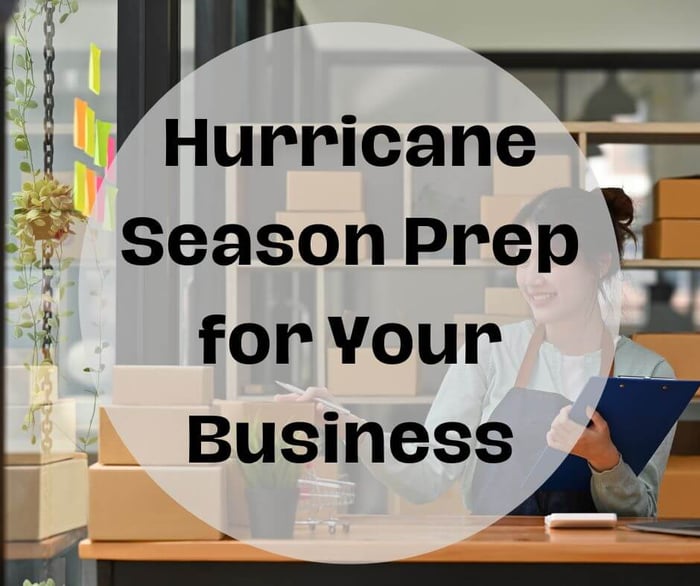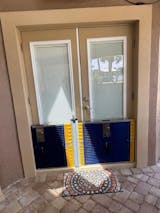Hurricane season can be a nerve-wracking time, especially for business owners in Florida. Getting your business ready for hurricanes and fast recovery can save you a lot of headaches and money in the long run. Here are some simple and practical tips to help you prepare, including how to use flood barriers the conventional way.
Hurricane Season in Numbers
Hurricane season can wreak havoc on businesses, causing extensive damage that can be difficult, if not impossible, to recover from. Here's a look at the types of damage hurricanes can cause and why some businesses may never reopen after such a disaster.
Structural Damage
-
- Wind Damage: High winds can rip off roofs, shatter windows, and bring down walls. Buildings may be destroyed or suffer significant structural damage, making them unsafe.
- Water Damage: Heavy rains and storm surges can lead to severe flooding. Floodwaters can ruin interiors, damage electrical systems, and destroy important equipment and inventory.
- Debris Impact: Flying debris can cause further damage to buildings and vehicles, compounding the overall destruction.
Operational Disruption
-
- Power Outages: Hurricanes often cause widespread power outages, which can last days or even weeks. This can halt business operations and lead to significant financial losses.
- Supply Chain Interruptions: Disrupted transportation networks and damaged infrastructure can make it difficult to receive supplies and deliver products.
- Employee Availability: Employees may be unable to work due to evacuation orders, personal losses, or transportation issues.
Financial Loss
-
- Immediate Costs: These include emergency repairs, temporary relocation expenses, and costs for securing the property.
- Long-Term Costs: Long-term financial impacts can include decreased revenue due to downtime, loss of customers, and increased insurance premiums.
Why Do Some Businesses Never Reopen?
Unfortunately, many businesses fall victim to hurricane season and other natural disasters every year. And physical damage to the property is not always the main reason. Here are the most common reasons that make your business most vulnerable:.
Insufficient Insurance Coverage
Many businesses do not have adequate insurance to cover all types of hurricane season damage. Standard property insurance often doesn’t cover flood damage, and many businesses lack flood insurance. According to the Insurance Information Institute, only about 14% of American homeowners have flood insurance, and the number is likely similar for small businesses.
High Repair Costs
The cost of repairs can be prohibitively high. FEMA estimates that 40% of small businesses never reopen after a disaster and another 25% fail within a year. Repairing extensive damage can exceed the financial capacity of many small businesses.
Loss of Customer Base
Businesses in heavily affected areas may lose a significant portion of their customer base if residents relocate or if the local economy suffers long-term damage. For example, after Hurricane Katrina in 2005, New Orleans saw a massive population decrease, leading to a prolonged economic downturn.
Interruption of Cash Flow
Extended periods of inactivity can lead to a cash flow crisis. The Small Business Administration (SBA) reports that small businesses typically have about 27 days of cash reserves. An extended closure can quickly deplete these reserves, making it impossible to cover ongoing expenses.
Mental and Emotional Toll
The stress and emotional toll on business owners and their employees can be immense. The process of rebuilding can be overwhelming, leading some to decide not to reopen.
Statistics and Numbers
- Economic Losses: Hurricanes cause billions of dollars in damages. For example, Hurricane Harvey in 2017 resulted in approximately $125 billion in damages.
- Business Closures: As mentioned, FEMA reports that 40% of small businesses never reopen after a disaster and 25% more fail within a year.
- Power Outages: After Hurricane Maria in 2017, Puerto Rico experienced the largest blackout in U.S. history, affecting over 1.5 million customers and lasting for several months in some areas.
So, how do you prepare? And, even more, is there a point in trying to prepare and protect from such destructive power? It is not that hard to take care of your business and make sure that you reduce the damage to a minimum and get back in business sooner than you think.
Know Your Risk
First things first, understand how at risk your business is. Check local flood maps, see how strong your building is, and note how close you are to the water. Knowing your risk helps you plan better.
Make a Hurricane Plan
Create a plan that includes how to evacuate, emergency contacts, and steps to secure your property. Make sure all your employees know the plan and practice it regularly.
Get Flood Barriers
Flood barriers are a must to keep water out of your building. Dam Easy flood barriers are great because they’re easy to set up and take down. You can quickly place them around doors and other entry points to block floodwaters.
A cool thing about Dam Easy barriers is that they can double as window shutters. By putting these barriers over your windows, you can protect them from flying debris during a hurricane. This helps prevent broken glass and water damage inside your business.
$899.00
大坝容易®防洪闸门大坝
洪水在世界各地越来越普遍。曾经的百年现象,现在是房主必须面对的季节性趋势。
这正是为什么你需要这个大坝容易防洪闸门大坝!
作为重型和凌乱沙袋的一个很好的替代品,这个屏障提供了第一道防线,防止水进入你家的门窗。当洪水发生时,快速行动的能力至关重要。此防洪屏障可在 5 分钟内安装,为您提供可靠的防洪保护!
不要等到为时已晚。得到这个防洪屏障门坝,现在保护你的房子!
… Read MoreDamEasy防洪闸门坝 -终极防洪

Secure Outdoor Stuff
Bring in or secure any outdoor equipment and furniture. This stops them from being blown around and causing damage during high winds.
Backup Your Data
Make sure all your important business data is backed up and stored somewhere safe, like the cloud. This way, you can still access your data even if your office is damaged.
Stock Up on Emergency Supplies
Have a good supply of emergency items like first-aid kits, flashlights, batteries, and non-perishable food. These will help you and your employees stay safe if you need to stay put during a storm.
Check Your Insurance
Go over your insurance policies to make sure you’re covered for hurricane-related damage. Remember, flood insurance is usually separate from standard property insurance.
Keep Communication Open
Set up clear ways to communicate with your employees, customers, and suppliers. Use social media, email, and other platforms to give updates before, during, and after a hurricane. Keeping everyone informed helps keep things running smoothly.
Have a Recovery Plan
After a hurricane, you’ll want to get back to business quickly. Have a plan for assessing damage, contacting your insurance company, and making repairs.
Conclusion
Being prepared is the best way to protect your business during hurricane season. Know your risks, invest in solutions like Dam Easy flood barriers, and have a solid plan in place. Start preparing now to keep your business safe and ready to bounce back after a storm.



















